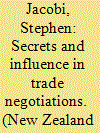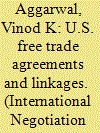| Srl | Item |
| 1 |
ID:
113055


|
|
|
|
|
| Publication |
2012.
|
| Summary/Abstract |
Fast track procedures have been key institutional mechanisms for U.S. trade policy making for nearly three decades. In April 2008, the U.S. House of Representatives made a small change to rules for considering the U.S.-Colombia Free Trade Agreement that significantly undermined fast track. However, these actions are really the culmination of the erosion of the utility of fast track in managing U.S. trade policy in the context of the challenges brought by increased openness in the global economy. Those challenges were laid bare with the first major bilateral agreement considered under fast track rules, the Canada-U.S. Free Trade Agreement in the late 1980s.
|
|
|
|
|
|
|
|
|
|
|
|
|
|
|
|
| 2 |
ID:
129396


|
|
|
| 3 |
ID:
120719


|
|
|
|
|
| Publication |
2013.
|
| Summary/Abstract |
Abstract This article examines the driving factors that account for patterns of linkages to broader economic, labor, environmental, and security issues in U.S. Free Trade Agreements (FTAs). Rather than only emphasizing trade benefits or security considerations as in much recent work on FTAs, this analysis provides a richer empirical picture by focusing on the full universe of U.S. FTAs. It conceptually differentiates among different issues that might be linked to FTAs and categorizes different patterns of U.S. FTAs based on the key issues that drove negotiations. The article then examines these negotiations from a theoretical standpoint, focusing on three elements. First, it examines the degree to which linkages in the U.S. domestic policymaking process are top-down or bottom-up. Second, it considers linkages types in terms of the underlying basis for issue connections - either power or knowledge. Third, it more briefly examines the bargaining process. The conceptual and theoretical analysis is buttressed through an examination of various illustrative cases of U.S. FTA negotiations to demonstrate the utility of this approach to illuminate the variety of 'linkage packages' that have driven U.S. FTAs. We conclude with the broader implications of linkages politics in FTAs.
|
|
|
|
|
|
|
|
|
|
|
|
|
|
|
|